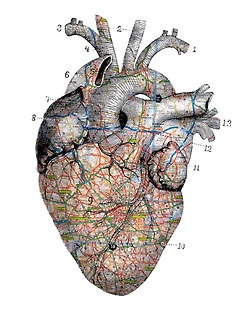A series of talks by Michael Stone about chapter 3 of The Yoga Sutra a text written by mysterious author(s) often named Patanjali in the second century. Notes by MH include reveries and imaginings. Centre of Gravity Fall 2011. www.centreofgravity.org
I’m just back from Halifax where I met a woman who had been in Mysore. When they study The Yoga Sutra they typically skip the third chapter, perhaps because it’s called Extraordinary Powers. There’s a reverse imperialism that imagines Western people are so lazy they’ll never get the superpowers. I think these powers are not so esoteric, as you sit, there are things that happen to you naturally, especially in retreat practice.

Words
The first superpower Patanjali describes is the ability to see the difference between words, perception and meaning. This gives you insight into the language of all beings. Language and meanings often get lumped together as one thing – all the patterns of perception that we use return to language at some point, there’s no escape from this. All experience is spoken in language. If you can’t rework experience into language it’s felt as trauma. Patanjali insists that experience is inflected by language, so artists working with language, for example, is a valid spiritual path.
God
Patanjali never mentions God. Ditto ditto for Buddha. The self is an internalized reflection of God – the notion of the self is a reification. Is God or the idea of God the root of all problems? Yogis shed light on the human side, not so much on the transcendent side, whereas the Abrahamic religions shed light on the transcendent side. As a result language, gender, the body become sinful. The Yoga tradition, on the other hand, finds a path via emotions and words. Shining light on the human side means shining light on a cold heart that needs a hug or the fact that you don’t know how to stay warm. To take care of the human side: that’s a valid path too.
Process
As we get concentrated the hindrances don’t arise so much, this doesn’t tend to happen in daily practice but in retreat practice. Sense organs decouple from sense objects, and consciousness is yolked or tied to the object of meditation – often the breath. What happens then is that you start noticing process – not the what of what happens, not the content, but how the content is presenting itself. How do I see what I see? How do I hear what I hear?

Yoga Sutra Remixed by Matthew Remski and Scott Petrie
3.18 Uncovering latent patterns gives insight into your past.
3.19 Understanding your mind gives insight into another’s mind,
3.20 but not insight into the things the other sees.
3.21 Meditating on the body resolves the feeling of being objectified.
3.22 Understanding the narrative of events gives insight into how things end.
3.23 Contemplating the grace of others inspires you.
3.24 Meditating on the non-human world gives shamanic intuition.
3.25 There is an intuitive relationship between internal light and the night sky.
3.26 Meditating on the sun gives insight into the earth.
3.27 Tracking the moon teaches you the stars.
3.28 Meditation on Polaris reveals how you move.

Yoga Sutra by Chip Hartranft
3.17 Word, meaning and perception tend to get lumped together, each confused with the others; focusing on the distinctions between them with perfect discipline yields insight into the language of all beings.
3.18 Directly observing latent impressions with perfect discipline yields insight into previous births.
In other words: everything is a samskara. Every table, every facial gesture, every relationship, every breath. Everything that is, is born into conditions. The second superpower is when we can see how things come into being via conditions.
3.19 Focusing with perfect discipline on the perceptions of another yields insight into that person’s consciousness.
The third superpower is that you can gain insight into a person’s consciousness, though it’s not saying you can read their mind. There are doctors who study faces, who learn to read faces, who give workshops to custom guards. You can read a face, but you can’t know what someone is thinking. What the content is.
3.20 But it does not yield insight regarding the object of those perceptions, since the object itself is not actually present in that person’s consciousness. You can have insight into a person, but not about the object they’re thinking about.
3.21 When the body’s form is observed with perfect discipline, it becomes invisible: the eye is disengaged from incoming light, and the power to perceive is suspended.
In meditation practice, when you close your eyes and feel sensations your mind superimposes the sense that you’re feeling these in your body. But they’re really happening in awareness. The patterns of sensation linguistically or in images seem to begin in the body, but they’re actually happening in awareness.
3.22 Likewise, through perfect discipline other percepts-sound, smell, taste, touch-can be made to disappear.
Chip “When the ‘perfect discipline’ of the three final limbs–dharana, dhyana and samadhi–is turned inward, consciousness settles. One may also turn the corner, however, and observe external objects from the vantage point of interiorization, developing extraordinary powers (vibhuti) in regard to the observed object. Most of these either are deployed in the phenomenal world or unlock its secrets; few directly pertain to wisdom (prajna).”
3.23 The effects of action may be immediate or slow in coming; observing one’s actions with perfect discipline, or studying omens, yields insight into death.
3.24 Focusing with perfect discipline on friendliness, compassion, delight, and equanimity, one is imbued with their energies.
3.25 focusing with perfect discipline on the powers of an elephant or other entities, one acquires those powers.
3.26 Being absorbed in the play of the mind’s luminosity yields insight about the subtle, hidden, and distant.
Chip: Once again the luminosity to which Patanjali refers here and throughout the YS… is satva, one of the three fundamental qualities of nature, or gunas. Sattva is the luminous, buoyant quality that gives consciousness the transparency and reflectivity that can be clearly recognized once consciousness settles. These, in turn, reveal pure awareness to itself.
3.27 Focusing with perfect discipline on the sun yields insight about the universe.
3.28 Focusing with perfect discipline on the moon yields insight about the stars’ position.
When you start to see these superpowers happening, it becomes clear that pure awareness and the stuff of the world is not the same. The world is changing but pure awareness is not changing.

Distraction
“These sensory gifts may seem like attainments but actually distract you from samadhi.” Why are they distractions? Because they start to feel like they’re happening to a self. You start “knowing” and then a self comes back. Be careful. All these can kick start a new identity. You can begin thinking you’re intuitive, for instance.
Let go
On retreat when you start feeling something you’ve never felt before a good teacher will help you deepen it, or let go of it. Often the deepest experiences don’t happen on the cushion, but in the interstitial spaces, when you get up and eat or during work duties, when silence loosens the usual grip. I remember a deep moment of stillness at a retreat when I stopped thinking, and the next two years of retreat were terrible because I kept comparing them to this moment. I kept holding on to this moment.
During retreat if something deep is going on but the sitter isn’t calm, I send them to the kitchen and get them off the cushion. If not, the integration or samadhi or interdependence doesn’t happen in a grounded way. Having an activity can make meditation deep and wise.
Teachers
It’s important to practice with teachers. As we get deep experiences we don’t know how to integrate them, how to process them. Our society relies so much on experts, but we have so few people that are wise.
Experiences don’t change behaviour, insight does. Insight motivates us to change our lives. Jack Kornfield: After the ecstasy, the laundry.
Enlightenment
I once asked Robert Thurman: what is enlightenment? He replied, “It’s supreme déjà vu.” You can have experiences of waking up that are unshakable. You’ll never forget them, they shift your views. But it doesn’t make your problems any easier, they don’t ease relations with your mother, they don’t make it easier to love or to be loved. Dogen reminds us that enlightenment is not what we think it is. Imagine if it was!

